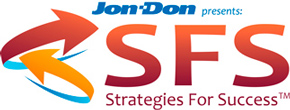One of my favorite sayings is: “We are all in this together.” This grew out of the central concept behind our Strategies for Success program which is Jon-Don becoming your “Partner for Success”. So we’re delighted when we receive letters like this one from SFS: Business Transformation graduate Al Paulsen who is the owner of Al’s Carpet Cleaning and Restoration in Grants Pass, OR. Steve
Steve:
 I just thought I would share this. I have many people I have learned from over the decades and I always try to share my experience with them. So, for what it’s worth:
I just thought I would share this. I have many people I have learned from over the decades and I always try to share my experience with them. So, for what it’s worth:
I have just returned from a great 5 week vacation. Work has been stressful for a year or so due to some of our water damage relationships being kind of “adversarial”. So I find myself taking on the difficult projects personally to allow my project managers to go out on jobs more rather than deal with problem clients.
But Steve, during my restful vacation I had kind of a “duh” epiphany!
My problem has been that I’ve been using the same management style and business model as I did when we grossed 30% of what we are doing now. I realized growth is more than just ‘cloning yourself’ or moving the decimal point in a different place on your profit and loss statement!
So I am now making changes to reflect the needs that our business has so I can concentrate on what I do best which is lead, facilitate others, and marketing. I haven’t been able to do these very important things because I have been busy doing less important tasks that others can do. (I’ve gotta say, Steve, that this problem just snuck up on me!)
But now I am so happy to be back at work and I am looking forward to having more empowered employees that can feel good about their success. I’m also going to suffer a LOT less stress knowing I am able to do what I need to do at work.
One of Chuck Violand’s Monday Morning notes (sign up here) really helped focus my thoughts on this challenge. In fact, I am going to cover it with my employees in our next staff meeting. I’m including the part that affected me the most here…
With a little help I could probably locate the exact intersection where I was sitting with my client waiting for the traffic light to change when he uttered two of the most alarming words an entrepreneur can say: “I’m bored.”
Instantly I knew I would have my hands full helping him re-engage in his business or organize it to remain a viable enterprise while he was off on whatever new venture would capture his attention. Either way I knew he was “checking out”!
Checking out is what happens when a business owner mentally disengages from his business and checking out is one of the surest ways to experience Stall or decline in a company. So, if we know this to be the case, why do so many entrepreneurs put their companies and their own futures at risk by checking out?
Sometimes as our businesses grow we aren’t sure what we’re supposed to be doing. We were fine when our companies were smaller and our time was spent on jobs we understood or were trained to perform.
But as our companies grow it’s not uncommon for them to outgrow the owner/CEO’s comfort zone to the point where many mentally check out of the responsibilities and decisions demanded of them.
A phrase that’s sometimes used to describe this is “rearranging deck chairs on the Titanic.” What this means is that we engage in inconsequential activities, those we’re either familiar with or comfortable doing, but have little impact on the performance of our companies. We take on these activities either because we don’t know what we’re supposed to be doing with our time, or because we don’t want to do the things we know we should…
So after sharing Chuck’s thoughts with my staff here is what I will say in our meeting:
“The common malady Chuck describes is the reason I have made some changes. Plus other changes will be implemented shortly. Our business is now too big for me to do all of the things I used to do. We do triple the work of the current system we are using and I have been getting stress issues.” Then I will tell my staff something very important:
“One of the ways you can assist in the process is to keep the system going.”
Steve, I don’t remember the physicist’s name who discovered that “all organizations and systems seek disorder and random change” but it is so true!
A lot of my time is spent trying to keep our system together. Mostly simple things like keeping the trucks and shop clean and organized. Following the paperwork rules consistently. If these are adhered to only at 90% then I have to take the time to supervise and that is not the best use of my time. It needs to be 100%.
 Here are two changes I am making immediately. One is that I am going to review files at the end of the job and not during the project. Another big change is that I personally am no longer going to take the TOUGH jobs. My employees are all capable of doing these difficult projects and I am not going to nursemaid them anymore!
Here are two changes I am making immediately. One is that I am going to review files at the end of the job and not during the project. Another big change is that I personally am no longer going to take the TOUGH jobs. My employees are all capable of doing these difficult projects and I am not going to nursemaid them anymore!
Al Paulsen
Wow, Al, I’d love to be a fly on the wall at your staff meeting! Actually it sounds like you have a great bunch of people. As we covered in your SFS, “All successful relationships are based on clearly defined expectations.” Congratulations and let your SFS team know how we can help! (One idea would be to send your key employees to one or more of our SFS Training Options!) Steve
